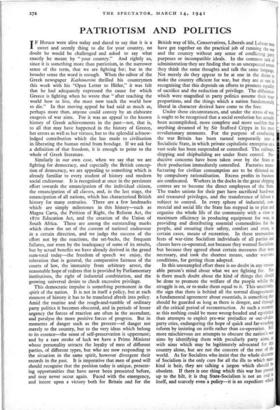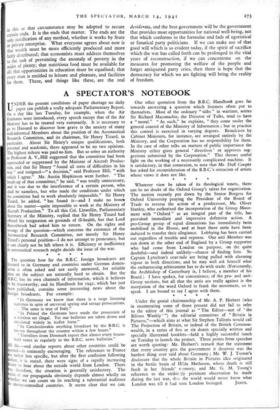PATRIOTISM AND POLITICS
IF Horace were alive today and dared to say that it is a 1 sweet and seemly thing to die for your country, no doubt he would be challenged and asked to say what exactly he meant by " your country." And rightly so, since it is something more than patriotism, in the narrower sense of the term, that we are fighting for; but in the broader sense the word is enough. When the editor of the Greek newspaper Kathimerini thrilled his countrymen this week with his "Open Letter to Hitler," it was felt that he had adequately expressed the cause for which Greece is fighting when he wrote that " after teaching the world how to live, she must now teach the world how to die." In that moving appeal he had said as much as, perhaps more than, anyone could convey by an elaborate exegesis of war aims. For it was an appeal to the known history of Greek achievements in the past—not, that is, to all that may have happened in the history of Greece, her errors as well as her virtues, but to the splendid acknow- ledged contribution which she has made to civilisation in liberating the human mind from bondage. If we ask for a definition of that freedom, it is enough to point to the whole of Greek literature.
Similarly in our own case, when we say that we are fighting for democracy, and especially the British concep- tion of democracy, we are appealing to something which is already familiar to every student of history and modern social endeavour. It is recognised at once in the persistent effort towards the emancipation of the individual citizen, the emancipation of all classes, and, in the last stage, the emancipation of all nations, which has characterised British history for many centuries. There are a few landmarks which are simply milestones in this history—such as Magna Carta, the Petition of Right, the Reform Act, the 187o Education Act, and the creation of the Union of South Africa. These are among the outstanding marks which show the set of the current of national endeavour in a certain direction, and we judge the success of the effort not by the reactions, the set-backs, the frequent failures, nor even by the inadequacy of some of its results, but by actual benefits we have already derived in the grand sum-total today—the freedom of speech we enjoy, the toleration that is general, the comparative fairness of the courts of law, the immunity from arbitrary arrest, the reasonable hope of redress that is provided by Parliamentary institutions, the right of industrial combination, and the growing universal desire to check excessive privilege.
This democratic impulse is something permanent in the spirit of the nation. It is not in itself a policy, but at each moment of history it has to be translated afresh into policy. Amid the routine and the rough-and-tumble of ordinary party politics it becomes obscured, and in periods of lesser urgency the forces of reaction are often in the ascendant, and paralyse the more positive forces of progress. But in moments of danger such as the present—of danger not merely to the country, but to the very ideas which belong to its essence—the sense of self-preservation is uppermost; and by a rare stroke of luck we have a Prime Minister whose personality attracts the loyalty of men of different parties, of different types, but who are now responding to the situation in the same spirit, however divergent their records in the past. It is imperative that men of good will should recognise that the position today is unique, present- ing opportunities that have never been presented before, and may never occur again. Faced with the emergency, and intent upon a victory both for Britain and for the British way of life, Conservatives, Liberals and Labour men have got together on the practical job of running the war and the country without any sense of conflicting party purposes or incompatible ideals. In the common task of administration.they are finding that to an unexpected extent they think the same thoughts and talk the same language. Not merely do they appear to be at one in the desire to make the country efficient for war, but they are at one in recognising that this depends on efforts to promote equality of sacrifice and the reduction of privilege. The differences' which were magnified in party politics assume their truer proportions, and the things which a nation fundamentally liberal in character desired have come to the fore.
Under these circumstances, and under the stress of war, it ought to be recognised that a social revolution has actually been accomplished, more complete and more sudden than anything dreamed of by Sir Stafford Cripps in his most revolutionary moments. For the purpose of conducting the war Britain has been turned temporarily into a Socialistic State, in which private capitalistic enterprise on a vast scale has been suspended or controlled. The railways, shipping and shipbuilding are under State control. Pro- ductive concerns have been taken over by the State or their production immediately controlled. Factories manu- facturing for civilian consumption are to be thinned out by compulsory rationalisation. Excess profits in business are confiscated. Workers in the docks in the great shipping centres are to become the direct employees of the State. The trades unions for their part have sacrificed hard-won and treasured privileges, and the transference of labour is subject to control. In every sphere of industrial, com- mercial and social life the State has stepped in to plan and organise the whole life of the community with a view to maximum efficiency in producing equipment for war, in providing and distributing essential commodities for the people, and ensuring their safety, comfort and even, in certain cases, means of recreation. In these tremendous feats of war-time Socialism individuals of all parties and classes have co-operated, not because they wanted Socialism. but because they agreed about certain measures that were necessary, and took the shortest means, under war-tins conditions, for getting them adopted.
In this unexampled effort there is no doubt in any reason- able person's mind about what we are fighting for. Nor is there much doubt about the kind of things that should be done to promote the welfare of the people whilst the struggle is on, or to make them equal to it. This unanim* the sign that there is behind all the normal disagreements a fundamental agreement about essentials, is something that should be guarded as long as there is danger, and through all the critical period of reconstruction. At such a moment as this nothing could be more wrong-headed and egotistical than attempts to exploit pre-war prejudice or out-of-date party cries, endangering the hope of quick and far-reaching reform by insisting on strife rather than co-operation. Still more mischievous are attempts to obscure the nation's sval aims by identifying them with peculiarly party aims, Or with aims which may be legitimately advocated for this country alone, but are not the concern of the rest of the world. As for Socialists who insist that the whole doctrine of Socialism is the only cure for all the ills to which man- kind is heir, they are talking a jargon which should be obsolete. If there is one thing which this war has proved. up to the hilt, it is that State-Socialism is not an end nl itself, and scarcely even a policy—it is an expedient which in this or that circumstance may be adopted to secure certain ends. It is the ends that matter. The ends are the only justification of any method, whether it works by State or private enterprise. What everyone agrees about now is that wealth must be more efficiently produced and more fairly distributed; that economists must address themselves to the task of preventing the anomaly of poverty in the midst of plenty; that nutritious food must be available for all; that opportunities in education must be equalised; that every man is entitled to leisure and pleasure, and facilities for them. These, and things like these, are the real desiderata, and the best government will be the government that provides most opportunities for national well-being, not that which conforms to the formulae and fads of egotistical or fanatical party politicians. If we can make use of that good will which is so evident today, if the spirit of sacrifice which the war has called forth can be prolonged in the vital years of reconstruction, if we can concentrate on the measures for promoting the welfare of the people and forget antiquated party cries, then there is hope that the democracy for which we are fighting will bring the reality of freedom.































 Previous page
Previous page